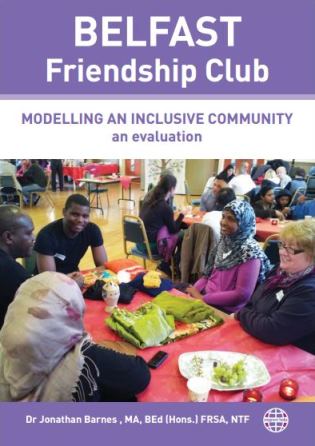Modelling an inclusive community – an evaluation of Belfast Friendship Club
Building inclusive communities
Last year, Jonathan Barnes of Migrant Help UK visited Belfast Friendship Club on several occasions to find out more about how the group works.
He wrote a report based on the experiences of club members and others to make recommendations for those interested in forming similar clubs elsewhere to help build inclusive communities.
How Belfast Friendship Club works
Here is some of what he had to say.
“Belfast Friendship Club (BFC) is an informal social group that has been meeting in a South Belfast Café almost every Thursday evening since 2009. Its aims are simple. It is a club for those seeking and offering friendship. BFC members comprise local Belfastians and an ever-changing mix of newcomers to the city who meet to chat.”
“users unanimously agreed that the BFC was a safe place, welcoming, egalitarian, supportive, and important in their lives.”
“The particular strengths of the BFC are its:
– Welcome;
– Clear and lived values;
– Focus on friendship;
– Diverse membership (including significant numbers of ‘locals’);
– Simple and effective organisational structures;
– Successful methods of communication;
– Emphasis on the well-being of members and community;
– Success at integration;
– Reliability; and
– Efficiency in sharing and delivering relevant information.”
What members said
Here are some of the comments from the people he interviewed.
“It’s fabulous. It’s just really diverse. Lots of different nationalities… it is a platform for myth-busting.” (Gee, Sri Lanka)
“…it was the warmth and the welcome and the love that we got here was amazing ….they are so loving and caring they are willing to listen to what you are going through.” (Everson, Zimbabwe)
“…there’s no hidden agenda, neutral ground, removed from the clinical idea of helping people, it’s not a service, not a committee.” (Jenny, Belfast)
“If I needed help, this is the place I’d go.” (Encarta, Spain)
“Nobody is ever made to feel like an outsider.” (Vicky, Latvia
“… [in BFC] you can tuck your problems away..” (Beauty, Zimbabwe)
“It’s really friendly, no one judges, … you can just be yourself, you can have a chat and it’s a good place to relax and sort of chill..” (Pablo, NI)
“…it’s the constant that it’s here all the time. Every Thursday you come and the door is open and it’s always here… You can rely on it.” (Lorenzo, Italy)
Recommendations for other groups
Jonathan made recommendations for similar groups to be created elsewhere, including:
“Migrant Help UK (should seek) to replicate this club in the UK dispersal areas for refugees.
“the evaluation suggested the following:
– The booklet Be the Change be used as a guide;
– Leaders of future clubs visit the BFC;
– Club leaders prioritise the identification of safe, accessible, neutral premises;
– Club values are constantly and consistently monitored and upheld;
– Each club has a dedicated supporting committee;
(…)
– Schools consider setting up their own Friendship Clubs on similar lines to the
BFC in order to support the integration of migrant and refugee young people.”
Read the full report here
Belfast Friendship Club – modelling an inclusive community by Jonathan Barnes, Migrant Help UK


You must be logged in to post a comment.